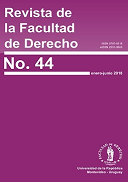The multicultural projection from an educational perspective of human rights
DOI:
https://doi.org/10.22187/rfd2018n44a3Keywords:
multiculturalism, multicultural education, human rights, universality, educational cultureAbstract
In order to gain a better understanding of the new challenges facing multicultural society, it is absolutely necessary to bear in mind the value that represents, on the one hand, the foundation of the content of human rights and, on the other hand, the need to guarantee an education based on an inclusive education. Working in the field of education presupposes working on differences, whether social, language or cultural. Thus, a diversity-oriented educational model is a resource that enables greater inclusiveness and universal recognition of the rights inherent in all human beings This work is based on the consideration of the universal values that should guide the learner as a guide and, in turn, must be a direct translation of the derivatives of human rights, since they are fully recognized by the international community. The purpose of knowledge and acquisition of values in the educational field is none other than to ensure that the autonomy of the individual and the full development of his personality are a palpable reality.
Downloads
References
Abdallah-Pretceille, M. (2001) La educación intercultural. Barcelona: Idea Books.
Altarejos Martínez, M. (2003). La equidad fundamento ético para una educación intercultural. Educación, Diversidad, Integración, (2), 175-176.
Antón, J., Lluch, X., Rodas, M. Ros, A. y Salinas, J. (1995). Educar desde el interculturalismo. Salamanca: Amarú,
Aznar Minguet, P. (2013). Criterios pedagógicos y retos educativos para abordar la integración de inmigrantes en la escuela. En S. Perió i Gregori, Multiculturalidad escolar y convivencia educativa (pp. 27-44). Madrid: ECU.
Bernal, A. (2003). La educación entre la multiculturalidad y la interculturalidad. En Estudios sobre educación, Nº 4, (pp. 93-94). Navarra: Universidad de Navarra.
Bueno Aguiar, J. J. (1998). Controversias en torno a la educación multicultural. Heuresis, Revista Electrónica de Investigación Curricular y Educativa, 1(3) 9-11, 21.
Cohen, L. y Cohen, A. (1986). Multicultural Education. Londres: Harper and Row.
Da Silva Gomes, A. (1995). Educación Antirracista e interculturalidad. Bilbao: AROVITE. (Cuadernos Bakeaz: Educación para la paz, Número 10).
De Lucas Martínez, J. (2002) “La sociedad multicultural y los conflictos políticos y jurídicos”, en AA.VV., J. De Lucas (Dir.), La multiculturalidad, Madrid: Consejo General del Poder Judicial.
Delors, J. (1993). La educación encierra un tesoro. Madrid: Santillana/Unesco.
Dickerson, S. (1993). The blindmen (women) and the elephant. A case for a comprensive Multicultural Education. Program at the Cambridge Rindge and Latin School. En T. Perry y J. Fraser (eds.) Freedom´s Plow. Teaching in the multicultural classroom, New York: Routledge.
Gago Guerrero, P. F. (2009). El papel del derecho social y de la política social en el sistema jurídico-social que reclaman los derechos humanos. Anuario de Derechos Humanos. Nueva Época, 10(1), 201.
García Castaño, J., Pulido Moyano, R. y Montes Castillo, A. (1994). Educación multicultural e intercultural: reflexiones sobre el caso español. European Journal of Intercultural Studies, 2(4), 2.
Herrera, M. (2000). La ciudad societaria. Granada: Universidad de Granada.
Kincheloe, J.L. y Steinberg, S. R. (1999). Repensar el multiculturalismo. Barcelona: Octaedro.
Marín Gracia, M. A. (2002). La construcción de la identidad en la época de la mundialización y los nacionalismos. En M. Bartolomé Pina, Identidad y ciudadanía. Un reto de la educación intercultural. Madrid: Narcea.
McCarthy, C. (1993). After the Canon. Knowledge and ideological representation in the multicultural discourse on curriculum reform. En C. McCarthy y W. Crichlow (eds.), Race, Identity and Representation in Education. Londres: Routledge.
Murillo, J., Greñeras, M., Sagalerva, A. y Vázquez, E. (1995). La investigación española en educación intercultural. Revista de Educación, 307(1), 21.
Orduña Allegrini, G. (2003). Desarrollo local, educación e identidad cultural. Revista de Estudios sobre Educación, 4(1), 76.
Peces Barba Martínez, G. (2004). Lecciones de Derechos Fundamentales. Madrid: Dykinson.
Peiró i Gregori, S. (2013). Multiculturalidad y valores de convivencia educativa. En S. Peiró i Gregori, Multiculturalidad escolar y convivencia educativa. Madrid: ECU.
Redfield, R. (1961). The Folk Culture of Yucatan. Chicago: University of Chicago.
Roig Vila, R. I. (2008). Prólogo a la obra. En S. Peiró i Gregori, Multiculturalidad escolar y convivencia educative. Madrid: ECU.
Santana Ramos, E. (2016). Los imperativos culturales como garantía de los derechos del inmigrante. Revista de la Facultad de Derecho (41), 291.
Santos Velasco, F. J. (2004). Desarrollo de la competencia intercultural en alumnado universitario: una propuesta formativa para la gestión en empresas multiculturales. Barcelona: Universidad de Barcelona.
Serna, P. (1990). Positivismo Conceptual y Fundamentación de los Derechos Humanos. Pamplona: EUNSA.
Touraine, A. (1995). ¿Qué es una sociedad multicultural? Falsos y verdaderos problemas. Claves de la razón práctica, (56), 21.
UNESCO (1997). Nuestra diversidad creativa. Informe de la Comisión Mundial de Cultura y Desarrollo. Perú: UNESCO.
Vielle-Grosjean, H. (2008). El contexto de la inmigración y su repercusión en el clima educativo de los centros docentes y sociales. En S. Peiró i Gregori, Multiculturalidad escolar y convivencia educativa. Alicante: ECU.
Published
How to Cite
Issue
Section
License
This journal provides open access to its content, based on the principle that providing the public with free access to research helps a greater global exchange of knowledge
Revista de la Facultad de Derecho. Creative Commons Reconocimiento 4.0 Internacional License.


